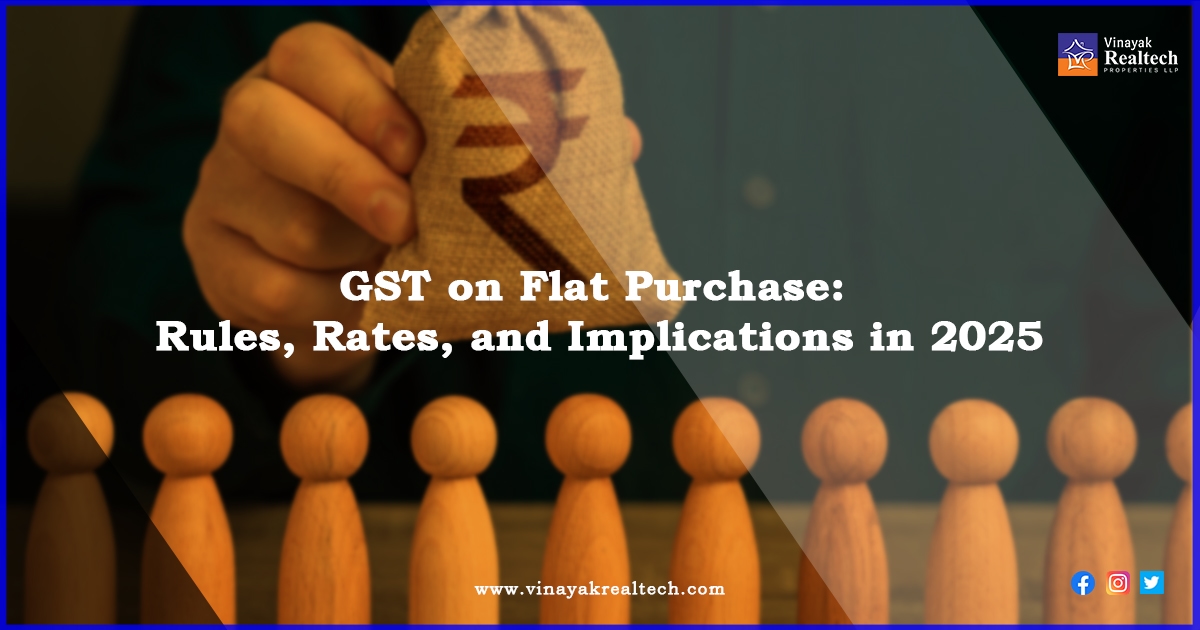GST on Flat Purchase: Rules, Rates, and Implications in 2025
Are you planning to buy a flat soon and deciding on a budget for it? Hold your breath to learn about the GST (Goods and Services Tax) first, as it significantly impacts the overall price. Learning about it in detail helps in juggling many numbers—loan amounts, EMIs, stamp duty, and registration fees. If you are stressing over how to gather the right knowledge regarding this, read this blog. In today’s blog, GST on Flat Purchase we will delve into crucial matters like GST rules, rates and implications for flats in 2025.
Let’s begin!
GST on Under-Construction Flats
According to the GST laws, under-construction properties are taxed at 5% under the GST framework. Take note that the amount of GST percentages can differ depending on the property type. Developers can claim an input tax credit (ITC) on materials and services used during construction; however, passing on this benefit to buyers isn’t mandatory. Hence, as a buyer, you must clarify any ITC benefits offered, as it can affect the final cost of the property.
GST on Ready-to-Move Flats
A completed real estate project with a valid occupancy certificate is classified as completed goods, not services. Therefore, as per the law, it does not attract any GST. Nevertheless, if a flat lacks a completion certificate or has ongoing interior work, it could still be considered under construction and subject to GST.
GST Rates for Apartment Costs Lower Than ₹45 Lakhs
GST varies a lot depending on the price of an apartment. For an apartment that costs below 45 lakhs, you have to pay 1% GST without input tax credit (ITC). This rate has been decided to support the affordable housing sector and the government’s “Housing for All” initiative. This concessional rate applies to under-construction properties that meet specific size, location and price criteria for affordable housing.
For instance, an under-construction flat with up to 60 sq. m. of carpet area in a metro city and up to 90 sq. m. in a non-metro city is considered in this context. These conditions are intended to make housing more accessible, especially in growing urban areas. Additionally, it is helping in promoting development in the real estate industry.
GST on Flat Purchase Above ₹50 Lakhs
GST works in slabs, and a slight rise in the overall price can attract higher GST. For example, you have to pay 1% GST for an under-construction flat that costs 45 lakhs. However, the GST rate jumps to 5% if the price range touches 50 lakhs. Remember, this GST is also not applicable for completed, ready-to-move flats.
GST on Registration of a Flat in India
During the registration, you do not need to pay any GST as the property has already received the occupancy certificate. Properties with a valid Completion Certificate are always exempt from GST. If you are new to this term, a Completion Certificate is a legal document issued by the local municipal or development authorities. The certificate is issued only when the building (flat or property) has been constructed according to the approved building plan. Moreover, the project complies with local laws and regulations.
The GST rates on the flats depend on various factors such as the property caret area, location, and whether it is under construction. Hence, consider every factor while making the budget. When drafting it, remember that the final cost of a new apartment can vary depending on whether the developer passes the Input Tax Credit (ITC) benefit to the buyer.
What Are the Costs That GST Doesn’t Cover?
The real estate industry is known for red tape and different tax implications. Due to this, the present and potential buyers face confusion. In this, one of the most common buyer misconceptions is that GST replaced stamp duty and registration fees. Well, it hasn’t; the state-level charges are calculated on the property’s agreement value. For instance, depending on the property’s value, varying by state and occasionally by the gender of the buyer or other factors, the stamp duty ranges from 5 to 10%. Another important state tax is the registration fee, which is commonly 1% of the property value or a fixed sum set by the state.
A GST Focused Guide For Buyers
Buying a property can be overwhelming if you do not follow the right guide. Therefore, here is a guide that mainly focuses on GST.
Check Completion Status
Check the completion certificate status before making the final payment or starting the EMI. If you are planning to invest within the jurisdiction of the Kolkata Municipal Corporation, use their dedicated portal. For that, visit the KMC website at kmcgov.in and navigate to the section for Building Completion Certificate Search. With the building sanction number, you can check the status effortlessly.
Request Price Breakdown
Ask your builder for a clear price breakdown, including the GST cap. When requesting this, ensure that the GST portion is shown separately in the cost sheet or invoice. Additionally, confirm affordable housing classification. This requires both a price cap (₹45 lakh or less) and a size limit (up to 60 sq m carpet area in metros, 90 sq m in non-metros). To maintain the transparency of the process, insist on GST-compliant invoices. This prevents double taxation.
Budget Considering All the Expenses
Crafting the right budget is the most essential aspect of your real estate investment. Therefore, do not forget to calculate other expenses like stamp duty, legal fees, parking, and any one-time maintenance deposits. These costs significantly affect the final payable amount.
Tips For Efficient Investment for GST on Flat Purchase
Opt for an Under-construction Flat
It might sound surprising, however, choosing an under-construction flat is the best decision you can ever make. Although completed buildings do not attract GST, builders tend to charge more when the work is completed and possession is near. Moreover, booking during the construction allows you to personalise the flat.
Check the Project’s GST Regimefor GST on Flat Purchase
GST laws are not fixed, and you just don’t know which one the builder is following (old or new). Ask if the builder opted to stay with the old 8%/12% rates (with ITC) or moved to the new 1%/5% system.
Final Thought:GST on Flat Purchase
Many people believe that GST on Flat Purchase has made the real estate buying complex. Well, it is not right; instead, it has turned the process transparent and made calculations easier. Use the aforementioned details while calculating teh final price and make an informed decision.
Still struggling with it? Connect with us. At Vinayak Realtech, we clearly inform our clients about GST details and help them make the right choice. Additionally, our sales team provide all the required details to educate the buyers.














Leave a Reply